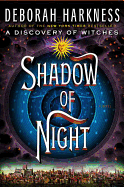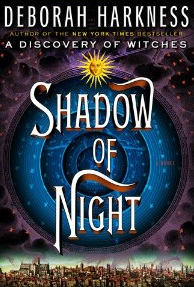
 When A Discovery of Witches debuted in 2011, Shelf Awareness noted that Deborah Harkness's debut novel injected a conventional vampire-witch romance with enough propulsive plot to keep readers hanging on for more--right up until its frustrating non-ending. Well, Shadow of Night picks up exactly where we left off, as Diana Bishop and Matthew Clairmont take a lengthy detour from their present-day troubles into late 16th-century Europe.
When A Discovery of Witches debuted in 2011, Shelf Awareness noted that Deborah Harkness's debut novel injected a conventional vampire-witch romance with enough propulsive plot to keep readers hanging on for more--right up until its frustrating non-ending. Well, Shadow of Night picks up exactly where we left off, as Diana Bishop and Matthew Clairmont take a lengthy detour from their present-day troubles into late 16th-century Europe.
The couple (now married) are on a quest: since the alchemical manuscript that promises to unlock the mysteries of their supernatural existence is hidden by magic in the present, they've decided to look for it in the past. It's the second time around Elizabethan England for Matthew, of course, so he can call upon friends like Sir Walter Raleigh and the Earl of Northumberland (with grudging help from Christopher Marlowe, who clearly resents Diana's presence). Meanwhile, Diana is also trying to come to terms with her untapped powers, and searches for local assistance--not an easy task when anti-witch hysteria is on the rise. There's also an essential visit to Matthew's family castle in France, where his father, the overwhelming Philippe de Clermont, forces a reappraisal of their relationship.
Harkness packs the story with all-star figures, up to and including Elizabeth I and Holy Roman Emperor Rudolf II, and tantalizing historical tidbits such as the Voynich Manuscript and the legend of Prague's golem. At times, the research gets a bit show-offy: it's not enough that Matthew is closely linked to the Elizabethan School of Night; he also has to be the true author of an anonymous verse commonly attributed to Raleigh. For most readers, though, these virtuoso flourishes won't be distracting, just more local color.
The core of the story is still the intimate bond between Diana and Matthew, two headstrong characters whose parallel journeys of self-discovery are an ongoing dramatic cycle of argument and reconciliation. Each makes a powerful breakthrough in Shadow of Night--emotional climaxes that are doubly important because, in true "middle volume of a trilogy" tradition, the outward plot mechanics are basically holding everything in place until the couple can return to the present and confront their enemies. This time, Harkness brings the story to a relatively solid conclusion. --Ron Hogan, founder of Beatrice.com
Shelf Talker: The follow-up to Harkness's bestselling debut sidesteps into Elizabethan England, where a modern-day witch and vampire make important discoveries about themselves and their love.

